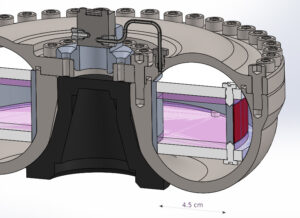ANR CISTRE
Deep Interior Super-Earths Convection
Financement : ANR, 555,735.71 k€ []
Coordinateurs : Thierry Alboussière
Établissement porteur : CNRS
Durée : 2026-2030

Résumé du projet
The internal dynamics of planets is a key ingredient for their thermal evolution during several billion years. It has consequences in terms of habitability, surface topography, interaction with an atmosphere, generation of an internal magnetic field. The antagonist effects of density segregation or melting differenciation versus convection mixing determine the amount of chemical interaction between layers at different depths. Pressure gradients, mostly of hydrostatic origin, have a large impact on planetary convection. They cause a radial temperature gradient due to adiabatic compression/decompression in descending/ascending currents. Convection is necessarily associated with important dissipative phenomena. Pressure gradients also cause phase transitions within the mantle of the rocky planets, within the gas giant planets (hydrogen/helium) or within the icy planets (water/ice). Among the huge number of convection experiments found in the literature, almost none have included such compressibility effects. In the present project, a breakthrough in convection studies will be made, as conditions similar to those of the interior of large exo-planets will be reached in the hypergravity environment of a fast centrifuge. This is possible in experiments when ratios of parameters – not individual dimensional parameters – have the same value as in natural objects. This will be the case of the dissipation number which quantifies the relative influence of pressure and temperature on density. The experimental results will be analyzed in light of numerical simulations that will be carried out within our project. Following our work, modelling thermal evolution of the Earth and other planets, like super-Earths, will rely on experimental results as a guide for future scenarios.

LEAD Technologies Inc. V1.01
Liste des membres du LGL-TPE impliqués :